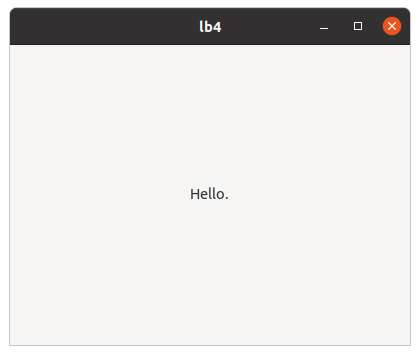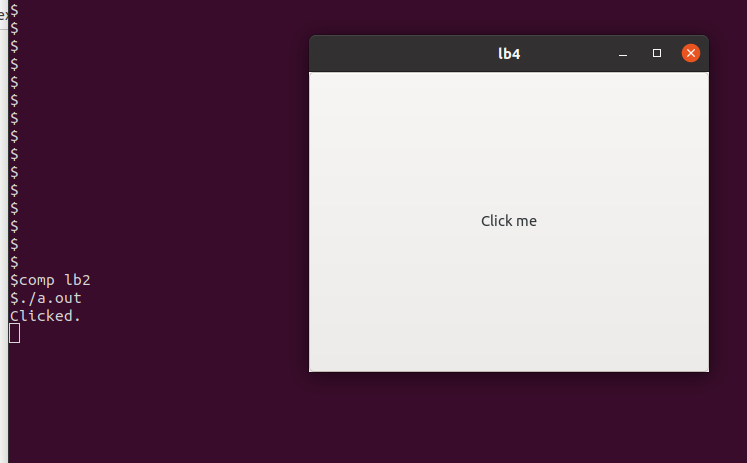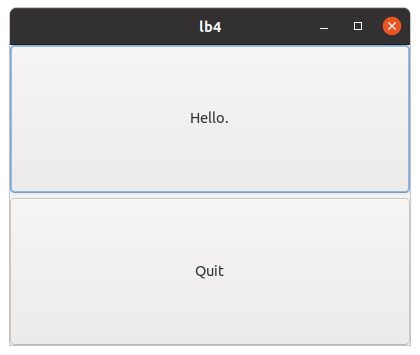10 KiB
Up: Readme.md, Prev: Section 2, Next: Section 4
Widgets (1)
GtkLabel, GtkButton and Gtkbox
GtkLabel
We made an window and show it on the screen in the previous chapter. Now we go on to the next topic, widgets in the window. The simplest widget is GtkLabel. It is a widget with a string in it.
1 #include <gtk/gtk.h>
2
3 static void
4 on_activate (GApplication *app, gpointer user_data) {
5 GtkWidget *win;
6 GtkWidget *lab;
7
8 win = gtk_application_window_new (GTK_APPLICATION (app));
9 gtk_window_set_title (GTK_WINDOW (win), "lb4");
10 gtk_window_set_default_size (GTK_WINDOW (win), 400, 300);
11
12 lab = gtk_label_new ("Hello.");
13 gtk_window_set_child (GTK_WINDOW (win), lab);
14
15 gtk_widget_show (win);
16 }
17
18 int
19 main (int argc, char **argv) {
20 GtkApplication *app;
21 int stat;
22
23 app = gtk_application_new ("com.github.ToshioCP.lb1", G_APPLICATION_FLAGS_NONE);
24 g_signal_connect (app, "activate", G_CALLBACK (on_activate), NULL);
25 stat =g_application_run (G_APPLICATION (app), argc, argv);
26 g_object_unref (app);
27 return stat;
28 }
29
Save this program to a file lb1.c.
Then compile and run it.
$ comp lb1
$ ./a.out
A window with a message "Hello." appears.
There's only a little change between pr4.c and lb1.c.
Diff is a good program to know the difference between two files.
$ diff misc/pr4.c lb1.c
5a6
> GtkWidget *lab;
8c9
< gtk_window_set_title (GTK_WINDOW (win), "pr4");
---
> gtk_window_set_title (GTK_WINDOW (win), "lb4");
9a11,14
>
> lab = gtk_label_new ("Hello.");
> gtk_window_set_child (GTK_WINDOW (win), lab);
>
18c23
< app = gtk_application_new ("com.github.ToshioCP.pr4", G_APPLICATION_FLAGS_NONE);
---
> app = gtk_application_new ("com.github.ToshioCP.lb1", G_APPLICATION_FLAGS_NONE);
This tells us:
- The definition of a variable lab is added.
- The title of the window is changed.
- A label is generated and connected to the window.
The function gtk_window_set_child (GTK_WINDOW (win), lab) makes the label lab a child widget of the window win.
Be careful.
A child widget is different from a child object.
Objects have parent-child relationship and Widgets also have parent-child relationship.
But these two relationships are totally different.
Don't be confused.
In the program lb1.c, lab is a child widget of win.
Child widgets are always located inside its parent widget in the screen.
See the window appeared on the screen.
The window includes the label.
The window win dosen't have any parents.
We call such a window top-level window.
One application can have two or more top-level windows.
GtkButton
Next widget is GtkButton. It has a label or icon on it. In this subsection, we will make a button with a label. When a button is clicked on, it emits a "clicked" signal. The following program shows how to catch the signal and do something.
1 #include <gtk/gtk.h>
2
3 static void
4 on_clicked (GtkButton *btn, gpointer user_data) {
5 g_print ("Clicked.\n");
6 }
7
8 static void
9 on_activate (GApplication *app, gpointer user_data) {
10 GtkWidget *win;
11 GtkWidget *btn;
12
13 win = gtk_application_window_new (GTK_APPLICATION (app));
14 gtk_window_set_title (GTK_WINDOW (win), "lb4");
15 gtk_window_set_default_size (GTK_WINDOW (win), 400, 300);
16
17 btn = gtk_button_new_with_label ("Click me");
18 gtk_window_set_child (GTK_WINDOW (win), btn);
19 g_signal_connect (btn, "clicked", G_CALLBACK (on_clicked), NULL);
20
21 gtk_widget_show (win);
22 }
23
24 int
25 main (int argc, char **argv) {
26 GtkApplication *app;
27 int stat;
28
29 app = gtk_application_new ("com.github.ToshioCP.lb2", G_APPLICATION_FLAGS_NONE);
30 g_signal_connect (app, "activate", G_CALLBACK (on_activate), NULL);
31 stat =g_application_run (G_APPLICATION (app), argc, argv);
32 g_object_unref (app);
33 return stat;
34 }
35
Look at the line 17 to 19.
First, generate a GtkButton widget btn with a label "Click me".
Then, set it to the window win as a child.
Finally, connect a "clicked" signal of the button to a handler (function) on_click.
So, if btn is clicked, the function on_click is invoked.
Name the program lb2.c and save it.
Now compile and run it.
A window with the button appears. Click the button (it is a large button, you can click everywhere inside the window), then a string "Clicked." appears on the shell terminal. It shows the handler was invoked by clicking the button.
It's fairly good for us to make sure that the clicked signal was caught and the handler was invoked.
However, using g_print is out of harmony with GTK which is a GUI library.
So, we will change the handler.
The following code is lb3.c.
1 static void
2 on_clicked (GtkButton *btn, gpointer user_data) {
3 GtkWindow *win = GTK_WINDOW (user_data);
4 gtk_window_destroy (win);
5 }
6
7 static void
8 on_activate (GApplication *app, gpointer user_data) {
9 GtkWidget *win;
10 GtkWidget *btn;
11
12 win = gtk_application_window_new (GTK_APPLICATION (app));
13 gtk_window_set_title (GTK_WINDOW (win), "lb4");
14 gtk_window_set_default_size (GTK_WINDOW (win), 400, 300);
15
16 btn = gtk_button_new_with_label ("Quit");
17 gtk_window_set_child (GTK_WINDOW (win), btn);
18 g_signal_connect (btn, "clicked", G_CALLBACK (on_clicked), win);
19
20 gtk_widget_show (win);
21 }
And the difference between lb2.c and lb3.c is as follows.
$ diff lb2.c lb3.c
5c5,6
< g_print ("Clicked.\n");
---
> GtkWindow *win = GTK_WINDOW (user_data);
> gtk_window_destroy (win);
17c18
< btn = gtk_button_new_with_label ("Click me");
---
> btn = gtk_button_new_with_label ("Quit");
19c20
< g_signal_connect (btn, "clicked", G_CALLBACK (on_clicked), NULL);
---
> g_signal_connect (btn, "clicked", G_CALLBACK (on_clicked), win);
29c30
< app = gtk_application_new ("com.github.ToshioCP.lb2", G_APPLICATION_FLAGS_NONE);
---
> app = gtk_application_new ("com.github.ToshioCP.lb3", G_APPLICATION_FLAGS_NONE);
The change is:
- The function
g_printinlb2.cwas deleted and two lines above are inserted instead. - The label of
btnis changed from "Click me" to "Quit". - The fourth argument of
g_signal_connectis changed fromNULLtowin.
Most important is the fourth argument of g_signal_connect.
It is described as "data to pass to handler" in the definition of g_signal_connect in GObject API reference.
Therefore, win which is a pointer to GtkApplicationWindow is passed to the handler as a second parameter user_data.
Then, the handler cast it to a pointer to GtkWindow and call gtk_window_destroy and destroy the top window.
Then, the application quits.
GtkBox
GtkWindow and GtkApplicationWindow can have only one child. If you want to add two or more widgets inside a window, you need a container widget. GtkBox is one of the containers. It arranges two or more child widgets into a single row or column. The following procedure shows the way to add two buttons in a window.
- Generate GtkApplicationWindow.
- Generate GtkBox and set it a child of GtkApplicationWindow.
- Generate GtkButton and append it to GtkBox.
- Generate another GtkButton and append it to GtkBox.
After this, the Widgets are connected as following diagram.
Now, code it.
1 #include <gtk/gtk.h>
2
3 static void
4 on_clicked1 (GtkButton *btn, gpointer user_data) {
5 const gchar *s;
6
7 s = gtk_button_get_label (btn);
8 if (g_strcmp0 (s, "Hello.") == 0)
9 gtk_button_set_label (btn, "Good-bye.");
10 else
11 gtk_button_set_label (btn, "Hello.");
12 }
13
14 static void
15 on_clicked2 (GtkButton *btn, gpointer user_data) {
16 GtkWindow *win = GTK_WINDOW (user_data);
17 gtk_window_destroy (win);
18 }
19
20 static void
21 on_activate (GApplication *app, gpointer user_data) {
22 GtkWidget *win;
23 GtkWidget *box;
24 GtkWidget *btn1;
25 GtkWidget *btn2;
26
27 win = gtk_application_window_new (GTK_APPLICATION (app));
28 gtk_window_set_title (GTK_WINDOW (win), "lb4");
29 gtk_window_set_default_size (GTK_WINDOW (win), 400, 300);
30
31 box = gtk_box_new (GTK_ORIENTATION_VERTICAL, 5);
32 gtk_box_set_homogeneous (GTK_BOX (box), TRUE);
33 gtk_window_set_child (GTK_WINDOW (win), box);
34
35 btn1 = gtk_button_new_with_label ("Hello.");
36 g_signal_connect (btn1, "clicked", G_CALLBACK (on_clicked1), NULL);
37
38 btn2 = gtk_button_new_with_label ("Quit");
39 g_signal_connect (btn2, "clicked", G_CALLBACK (on_clicked2), win);
40
41 gtk_box_append (GTK_BOX (box), btn1);
42 gtk_box_append (GTK_BOX (box), btn2);
43
44 gtk_widget_show (win);
45 }
46
47 int
48 main (int argc, char **argv) {
49 GtkApplication *app;
50 int stat;
51
52 app = gtk_application_new ("com.github.ToshioCP.lb4", G_APPLICATION_FLAGS_NONE);
53 g_signal_connect (app, "activate", G_CALLBACK (on_activate), NULL);
54 stat =g_application_run (G_APPLICATION (app), argc, argv);
55 g_object_unref (app);
56 return stat;
57 }
58
Look at the function on_activate.
After the generation of GtkApplicationWindow, GtkBox is generated.
box = gtk_box_new(GTK_ORIENTATION_VERTICAL, 5);
gtk_box_set_homogeneous (GTK_BOX (box), TRUE);
The first argument arranges children vertically. The second argument is sizes between children. The next function fills a box with children, giving them equal space.
After that, two buttons btn1 and btn2 are generated and the signal handlers are set.
Then, these two buttons are appended to the box.
The handler corresponds to btn1 changes its label.
The handler corresponds to btn2 destroys the top-level window and the application quits.



